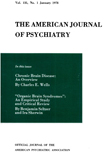THE PARANOIAC OFFICER AND THE OFFICER PARANEE
Abstract
1. The attitude of the paranoiac may be viewed as an outgrowth, on the part of the patient, of a defect in his machinery of social cooperation(9). His delusions are a direct expression of his effort nevertheless to attain an efficient adjustment. These express themselves in the fundamental social relationship that so inevitably characterizes paranoiac behavior: the relationship between the paranoiac and his victim, the paranee, which the patient rationalizes so beautifully into the delusion that the paranee is the actual persecutor.
2. During the course of this paper, an effort was made to indicate how paranoiac officers can detrimentally affect the careers of their subordinates who play the rôle of paranees. If an officer be relieved of his command because of mental disease, and particularly if he show evidence of paranoiac or paranoid disorder, we believe it the duty of the Army to investigate carefully his previous reports about junior officers, the boards he has convened and the charges he has pressed. We further believe, if the investigation shows that such reports and activities had been influenced by abnormal paranoid ideation, that the Army should delete all such deleterious reports and ratings from the 201 files and 66-1 cards on which they had been entered. In addition, we believe that as a preventive measure efficiency ratings should be made, not by a single commanding officer who under certain conditions may have had little or no contact with the officer so rated, but by three of the officers actually working with him including his immediate superior, and that the average of these three ratings should be the one to be entered on the 201 file of the officer in question.
3. This problem, however, is not specifically a military one. The psychoses of our patients seem somehow to have been precipitated by their sudden promotions to positions of authority. Hostile and perfectionistic individuals who drive their subordinates so ruthlessly are far from uncommon. The adjectives paranoid and paranoiac frequently connote pronounced and recognizable psychopathology, and as a result can scarcely be considered as descriptive of the type. To translate apt but scarcely printable G.I. slang into Greek words like proctophage or proctophagic merely begs the question, since so far as we know the metaphor exists only in American English. Nevertheless, some term like paranoiac, if used to describe personalities such as these, seems needed.
4. Such individuals cannot readily be screened out of large organizations. They may be found both inside the Army and out of it. Since no hope exists for curing individual patients and since institutionalization by its very nature can account for only a small percentage of the actual number of paranoiacs at large within the community, Brickner has suggested that the recognition of paranoiac (or anti-democratic) behavior be taught in school so that we ultimately will be trained to recognize such behavior the moment it manifests itself, will not be duped into rationalizing excuses for the paranoiac, will not exert undoubted effort in his behalf, will not ourselves become paranees, and will not be misled by rabble-rousers who for purposes of their own claim victimization by specific racial, national or other minority groups while at the same time projecting upon such groups all blame for the social or economic insecurity which at the moment these same rabble-rousers are actually exploiting.
To us, it is not so much a paranoiac individual like our lieutenant colonel who is of chief importance, nor even a paranoiac culture, so-called, like that developed by the Axis countries and their sympathizers: it is above all else their actual and potential victims who warrant attention. In our opinion, the emphasis must be placed on the means which society can develop, within individual communities in the case of the psychiatric disease, within local communities as well as the world community in the case of the sociological and political one, to protect itself collectively and individually, on the one hand from the aggrandizement of the paranoiac individual, and on the other from the equally menacing aggrandizement of those who deliberately attempt to exploit paranoiac attitudes.
Access content
To read the fulltext, please use one of the options below to sign in or purchase access.- Personal login
- Institutional Login
- Sign in via OpenAthens
- Register for access
-
Please login/register if you wish to pair your device and check access availability.
Not a subscriber?
PsychiatryOnline subscription options offer access to the DSM-5 library, books, journals, CME, and patient resources. This all-in-one virtual library provides psychiatrists and mental health professionals with key resources for diagnosis, treatment, research, and professional development.
Need more help? PsychiatryOnline Customer Service may be reached by emailing [email protected] or by calling 800-368-5777 (in the U.S.) or 703-907-7322 (outside the U.S.).



